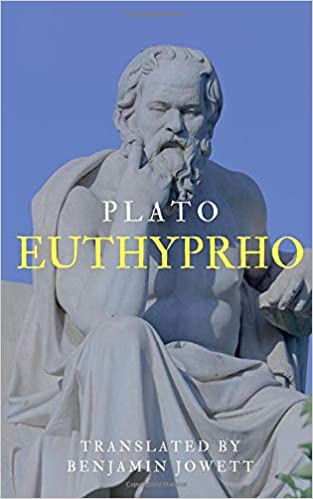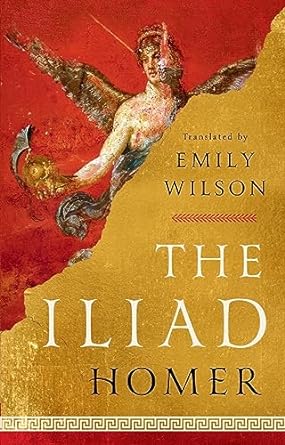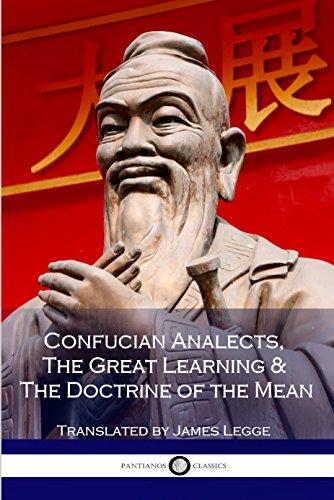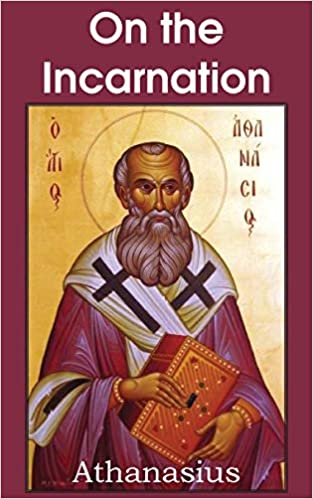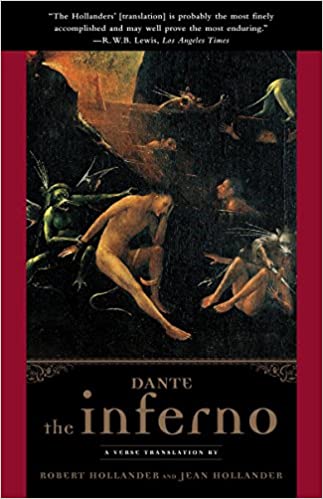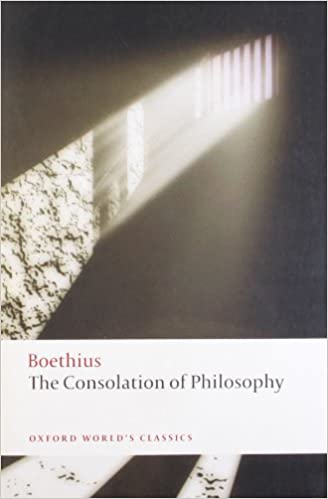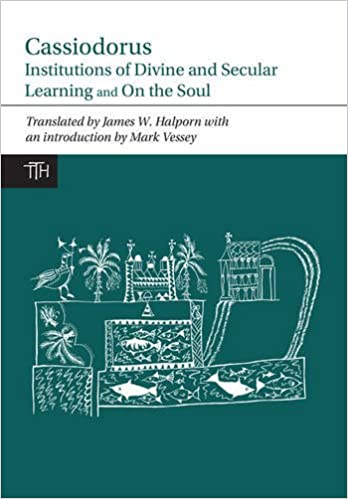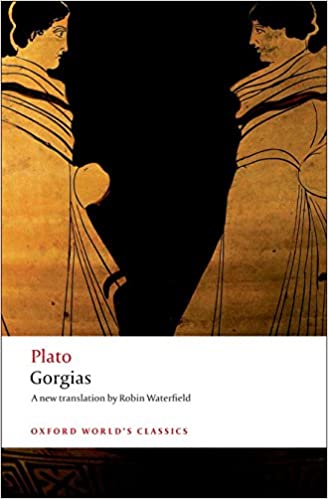Euthyphro
A new, beautifully laid-out edition of the 1892 translation by Benjamin Jowett (1817-1893) of Plato's classic work.
More info →Confucian Analects, The Great Learning & The Doctrine of the Mean
One of the classic four books of ancient Confucianism, The Great Learning consists of a short initial commentary attributed to Confucius himself, followed by a lengthier tract written by one of his disciples named Zengzi.
The text emphasises achieving balance in every day life and in thoughts. For the man who aspires to great wisdom, much time must be set aside for rest and contemplation. Life's priorities must be organised according to their importance, and harmony must be rigorously cultivated in everyday associations and relationships. In learning, one must not consider one kind superior to the exclusion of others, but must instead strive for balance.
More info →Athanasius: On the Incarnation
When I first opened his De Incarnatione I soon discovered by a very simple test that I was reading a masterpiece. I knew very little Christian Greek except that of the New Testament and I had expected difficulties. To my astonishment I found it almost as easy as Xenophon; and only a master mind could, in the fourth century, have written so deeply on such a subject with such classical simplicity. Every page I read confirmed this impression. I do not think the reader will find here any of that sawdusty quality which is so common in modern renderings from the ancient languages. That is as much as the English reader will notice; those who compare the version with the original will be able to estimate how much wit and talent is presupposed in such a choice, for example, as "these wiseacres" on the very first page. C. S. LEWIS
More info →The Inferno (The Divine Comedy Series)
The epic grandeur of Dante’s masterpiece has inspired readers for 700 years, and has entered the human imagination. But the further we move from the late medieval world of Dante, the more a rich understanding and enjoyment of the poem depends on knowledgeable guidance. Robert Hollander, a renowned scholar and master teacher of Dante, and Jean Hollander, an accomplished poet, have written a beautifully accurate and clear verse translation of the first volume of Dante’s epic poem, the Divine Comedy. Featuring the original Italian text opposite the translation, this edition also offers an extensive and accessible introduction and generous commentaries that draw on centuries of scholarship as well as Robert Hollander’s own decades of teaching and research. The Hollander translation is the new standard in English of this essential work of world literature.
More info →Cicero: On the Orator
From Amazon: "Cicero (Marcus Tullius, 106–43 BCE), Roman lawyer, orator, politician and philosopher, of whom we know more than of any other Roman, lived through the stirring era which saw the rise, dictatorship, and death of Julius Caesar in a tottering republic. In his political speeches especially and in his correspondence we see the excitement, tension and intrigue of politics and the part he played in the turmoil of the time. Of about 106 speeches, delivered before the Roman people or the Senate if they were political, before jurors if judicial, 58 survive (a few of them incompletely). In the fourteenth century Petrarch and other Italian humanists discovered manuscripts containing more than 900 letters of which more than 800 were written by Cicero and nearly 100 by others to him. These afford a revelation of the man all the more striking because most were not written for publication. Six rhetorical works survive and another in fragments. Philosophical works include seven extant major compositions and a number of others; and some lost. There is also poetry, some original, some as translations from the Greek."
More info →The Consolation of Philosophy
Boethius composed De Consolation Philosophiae in the sixth century A.D. while awaiting death by torture, condemned on a charge of plotting against Gothic rule, which he protested as manifestly unjust. Though a Christian, Boethius details the true end of life as the soul's knowledge of God, and consoles himself with the tenets of Greek philosophy, not with Christian precepts.
Written in a form called Meippean Satire that alternates between prose and verse, Boethius' work often consists of a story told by Ovid or Horace to illustrate the philosophy being expounded. The Consolation of Philosophy dominated the intellectual world of the Middle Ages; it inspired writers as diverse Thomas Aquinas, Jean de Meun, and Dante. In England it was rendered into Old English by Alfred the Great, into Middle English by Geoffrey Chaucer, and later Queen Elizabeth I made her own translation. The circumstances of composition, the heroic demeanor of the author, and the Meippean texture of part prose, part verse have been a fascination for students of philosophy, literature, and religion ever since.
More info →The Histories
From Amazon: "Cicero called Herodotus "the father of history," and his only work, The Histories, is considered the first true piece of historical writing in Western literature. With lucid prose, Herodotus's account of the rise of the Persian Empire and its dramatic war with the Greek city sates set a standard for narrative nonfiction that continues to this day. Illustrated, annotated, and filled with maps—with an introduction by Rosalind Thomas, twenty-one appendices written by scholars at the top of their fields, and a new translation by Andrea L. Purvis—The Landmark Herodotus is a stunning edition of the greatest classical work of history ever written."
More info →History of the Peloponnesian War
From Amazon:
Thucydides called his account of two decades of war between Athens and Sparta “a possssion for all time,” and indeed it is the first and still most famous work in the Western historical tradition. Considered essential reading for generals, statesmen, and liberally educated citizens for more than 2,000 years, The Peloponnesian War is a mine of military, moral, political, and philosophical wisdom.
More info →Confessions
From Amazon:
"Augustine's fourth-century spiritual autobiography not only is a major document in the history of Christianity, a classic of Roman Africa, and the unchallenged model through the ages for the autobiographical record of the journey to self-knowledge, it also marks a vital moment in the history of Western culture.
As Augustine explains how, when, and why he became the man he is, he probes the great themes that others were to explore after himCfaith, time, truth, identity, and self-understanding--with a richness of detail unmatched in ancient literature. Dense with vivid portrayals of friends, family, colleagues, and enemies, The Confessions chronicles the passage from a life of sensuality and superstition to a genuine spiritual awakening--in a powerful narrative of one man's inner education that continues to shape the way we think and act today."
More info →Institutions of Divine and Secular Learning
As a minister of the Ostrogothic regime in the time of Theoderic, Cassiodorus had as brilliant a political career as any Roman of the late empire. Around 538 CE he published a collection of his state letters under the title of Variae (TTH 12), and disappeared from the public record. Half a century later, dying at his country estate in Calabria, he left behind the exemplars for another world of texts: that of the Christian universe of Scripture, now encompassing the Seven Liberal Arts.
More info →Gorgias
One of Plato's most widely read dialogues, Gorgias treats the temptations of worldly success and the rewards of the genuinely moral life. Appealing to philosophers as a classic text of moral philosophy--and to everyone for its vividness, clarity, and occassional bitter humor--this new
translation is accompanied by explanatory notes and an illuminating and accessible introduction.

